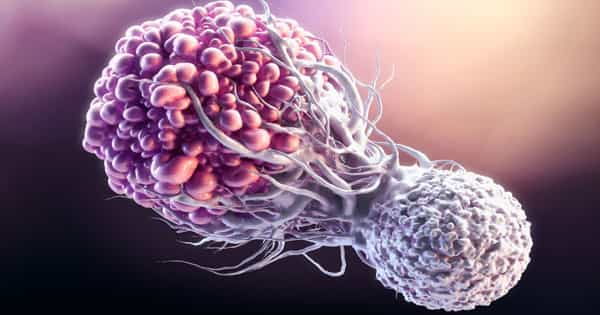A new study describes pMTnet, a new machine learning technique that can predict with high accuracy whether immune cells known as T cells can identify critical peptides known as neoantigens. The pMTnet technique, described online in Nature Machine Intelligence, could lead to new ways of predicting cancer prognosis and immunotherapy responsiveness.
Researchers and data scientists at UT Southwestern Medical Center and MD Anderson Cancer Center have developed an artificial intelligence technique that can identify which neoantigens, or cell surface peptides produced by cancer cells, are recognized by the immune system.
“It appeared that determining which neoantigens bind to T cell receptors and which do not was an impossible task. However, we are making progress with machine learning “Dr. Tao Wang, Ph.D., Assistant Professor of Population and Data Sciences at UT Southwestern and a member of the Harold C. Simmons Comprehensive Cancer Center and the Center for Genetics of Host Defense, is the study’s senior author.
Cancer cells’ genome mutations cause them to express various neoantigens on their surfaces. Some of these neoantigens are recognized by immune T cells that hunt for signs of cancer and foreign invaders, allowing the immune system to destroy cancer cells. Others, on the other hand, appear to be invisible to T cells, allowing cancers to spread unchecked.
Researchers and data scientists have developed an artificial intelligence technique that can identify which cell surface peptides produced by cancer cells called neoantigens are recognized by the immune system.
Researchers described pMTnet, a new machine learning technique, in a multi-institutional study. The algorithm was found to accurately predict which neoantigens were recognized by immune cells known as T cells and which were not. As a result of the technique, new avenues in the prediction of cancer outcomes and the potential efficacy of immunotherapies may become accessible.
“The presence of neoantigens is one of the biggest differences between normal and tumor cells for the immune system,” said Tianshi Lu, first co-author with Ze Zhang, doctoral students in the Tao Wang lab, which uses cutting-edge bioinformatics and biostatistics approaches to investigate the implications of tumor immunology for tumorigenesis, metastasis, prognosis, and treatment response in a variety of tumor types. “If we can figure out which neoantigens stimulate an immune response, we may be able to use this knowledge in a variety of different ways to fight cancer,” said Ms. Lu.

Predicting which neoantigens are recognized by T cells could aid researchers in developing personalized cancer vaccines, improving T cell-based therapies, and predicting how well patients will respond to other types of immunotherapies. However, there are tens of thousands of different neoantigens, and predicting which ones cause a T cell response has proven to be time-consuming, technically difficult, and expensive.
With grants from the National Institutes of Health (NIH) and the Cancer Prevention and Research Institute of Texas (CPRIT), the research team turned to machine learning in search of a better technique. They used data from known binding or nonbinding combinations of three different components: neoantigens; proteins called major histocompatibility complexes (MHCs) that present neoantigens on cancer cell surfaces; and the T cell receptors (TCRs) responsible for recognizing the neoantigen-MHC complexes. The algorithm was then tested against a dataset compiled from 30 different studies that had experimentally identified binding or nonbinding neoantigen T cell-receptor pairs. This experiment demonstrated that the new algorithms were highly accurate.
The researchers used this new tool to gather information on neoantigens cataloged in The Cancer Genome Atlas, a public database containing data from over 11,000 primary tumors. According to pMTnet, neoantigens generally elicit a stronger immune response than tumor-associated antigens. It also predicted which patients would respond better to immune checkpoint blockade therapies and have a higher chance of survival.
“As an immunologist, the most significant challenge currently confronting immunotherapy is determining which antigens are recognized by which T cells in order to leverage these pairings for therapeutic purposes,” said corresponding author Alexandre Reuben, Ph.D., Assistant Professor of Thoracic-Head & Neck Medical Oncology at MD Anderson. “pMTnet outperforms its current alternatives and brings us much closer to this goal.”
pMTnet was tested against a dataset compiled from 30 different studies that identified binding or nonbinding neoantigen T cell-receptor pairs experimentally. The newly developed algorithm demonstrated a high level of accuracy, according to this analysis.
Following that, the researchers used pMTnet to learn more about the neoantigens listed in The Cancer Genome Atlas, a public database containing data from over 11,000 primary tumors. When compared to tumor-associated antigens, the new tool revealed that neoantigens typically elicit a powerful immune response. The algorithm also assisted in predicting patient-related outcomes. This included which patients responded better to immune checkpoint blockade therapies and had higher overall survival rates.














